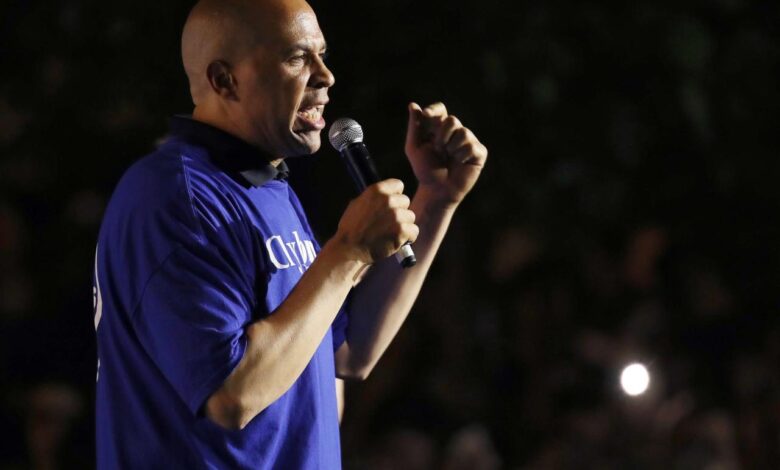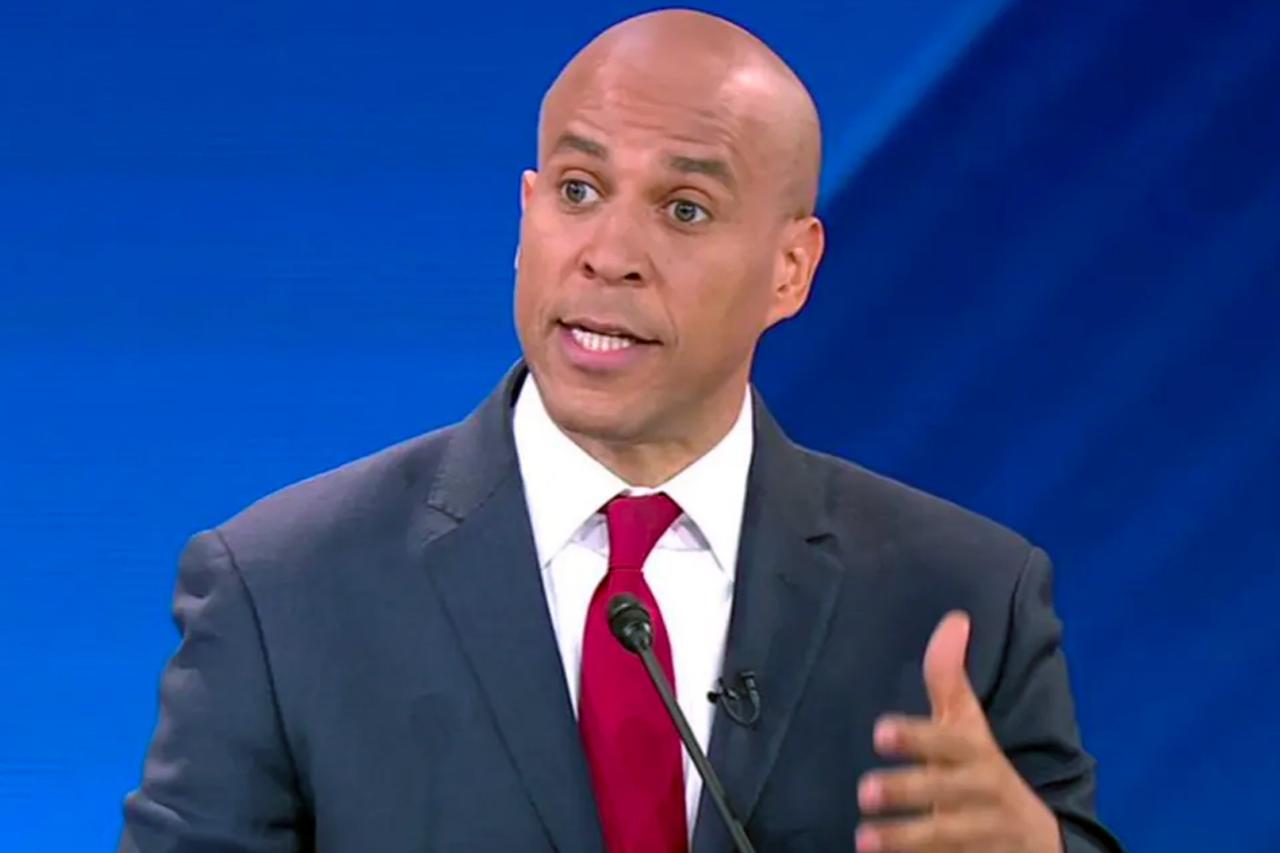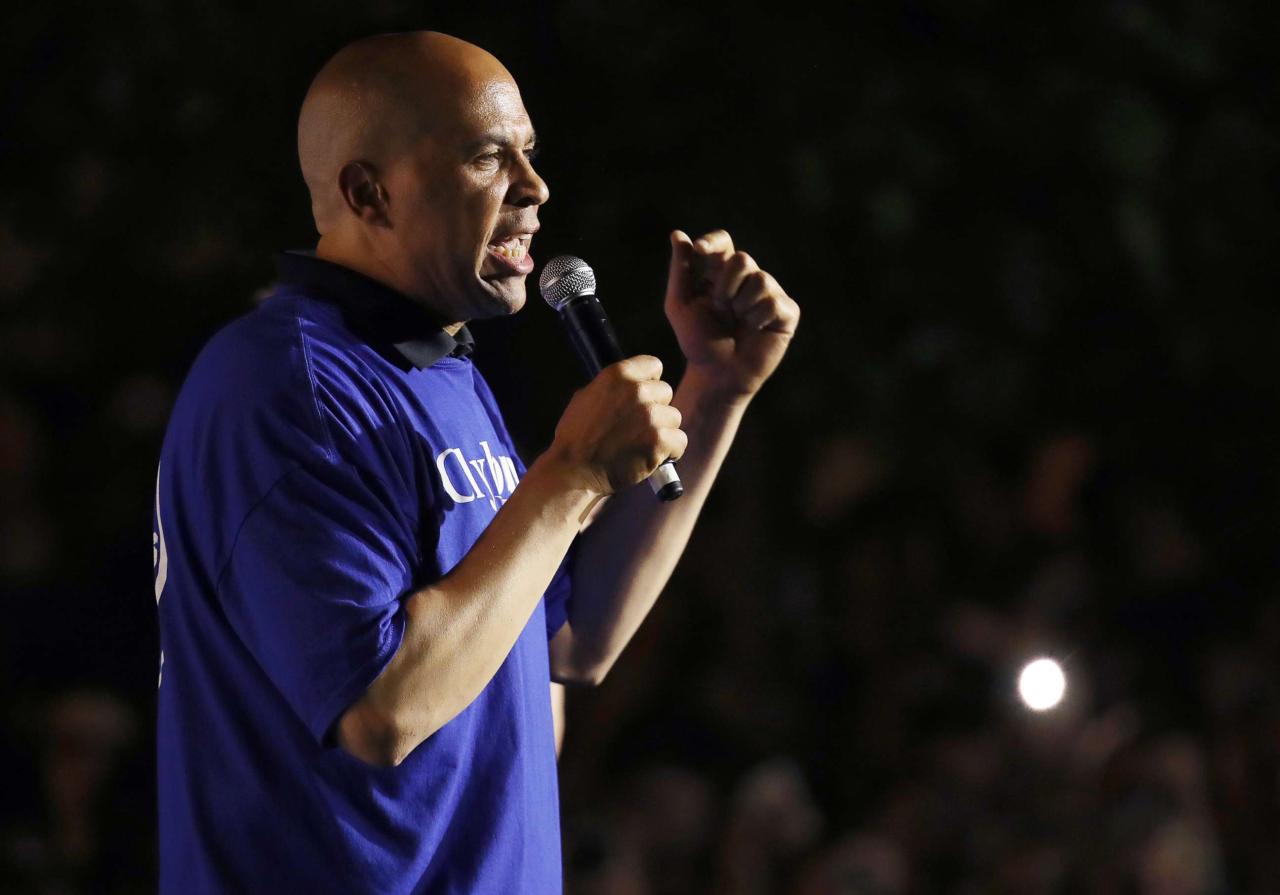
Cory Booker filibuster interview sets the stage for this enthralling narrative, offering readers a glimpse into a story that is rich in detail and brimming with originality from the outset. The interview, held during a period of significant political tension, delves into Booker’s perspective on critical issues facing the nation, providing valuable insights into his political philosophy and approach.
This analysis explores the key themes of the interview, examining Booker’s arguments, positions, and the context in which they were presented. We’ll also look at potential impacts on public opinion and future political discourse.
Summary of the Cory Booker Filibuster Interview

Cory Booker’s interview, situated within the context of ongoing political debates and legislative action, provided a nuanced perspective on his views regarding the current political climate and the pressing issues facing the nation. The interview delved into the intricacies of the filibuster debate, highlighting the senator’s approach to legislative strategy and his motivations behind his stance.The interview, given the current political landscape, offered insights into the complexities of the filibuster debate, and the senator’s perspective on the challenges and opportunities facing the country.
It served as a platform for Booker to articulate his policy positions and address concerns raised by the public and within the political arena.
Key Issues Discussed in the Interview
Booker’s interview addressed a variety of significant issues related to the ongoing legislative process. He emphasized the importance of finding common ground and productive solutions in a deeply divided political environment. The interview aimed to clarify his position on the filibuster, its potential impact, and alternative approaches to achieving legislative goals.
Senator Booker’s Perspective on the Filibuster
Booker articulated a nuanced perspective on the filibuster, acknowledging its historical role while emphasizing the need for legislative progress. He Artikeld his views on the current state of the filibuster, including its impact on the legislative process and its implications for achieving meaningful policy outcomes. He suggested that the filibuster’s current use may impede necessary progress, and that alternative methods for achieving bipartisan support should be explored.
Booker’s stance highlights the complexities of balancing historical precedent with the need for effective governance.
Legislative Strategies and Policy Positions
The interview provided a glimpse into Senator Booker’s approach to legislative strategy. He detailed his commitment to addressing key policy issues such as affordable housing, environmental protection, and criminal justice reform. He emphasized the importance of bipartisan cooperation and the need for innovative solutions to complex societal challenges.
Cory Booker’s filibuster interview was pretty intense, right? Thinking about his style, I wonder if he’s ever rocked some cigarette pants jeans? Learning how to style those could be surprisingly helpful for understanding how to dress for a serious interview – check out cigarette pants jeans how to style them for some great tips. Ultimately, though, the interview was all about the political debate, not his fashion choices.
The Context of the Interview
The interview occurred amidst intense debate surrounding the filibuster, its role in the Senate, and its impact on the legislative process. The ongoing political climate, characterized by partisan divisions, played a significant role in shaping the context of the discussion. Booker’s interview presented his perspective within this context, outlining his approach to finding common ground and achieving legislative objectives in a polarized political environment.
Specific Issues and Topics
- Affordable Housing: Booker highlighted the urgent need for increased funding and resources to address the growing housing crisis. He emphasized the importance of bipartisan collaboration to create long-term solutions.
- Environmental Protection: The interview addressed the senator’s commitment to environmental protection and climate action. He Artikeld his belief that comprehensive environmental policies are crucial for safeguarding the future.
- Criminal Justice Reform: Booker’s stance on criminal justice reform was a prominent theme. He emphasized the need for addressing systemic issues and promoting equity and fairness within the justice system.
Booker’s Arguments and Positions
Cory Booker’s interview provided a glimpse into his current political stances, revealing nuanced perspectives on various issues. He articulated his reasoning behind these positions, offering a framework for understanding his approach to governance. Comparing his views to those of other prominent figures provides context, showcasing similarities and differences in their approaches to policy. The interview highlighted potential shifts in Booker’s positions, offering insight into how his political philosophy has evolved.
Booker’s Stances on Economic Issues
Booker’s interview showcased a commitment to economic policies that prioritize the needs of working-class Americans. He advocated for policies aimed at increasing opportunities and reducing economic inequality. His emphasis on job creation and affordable housing aligns with the concerns of many Americans. He highlighted the need for targeted investments in underserved communities, aiming to address systemic issues that perpetuate economic disparities.
Comparison with Other Political Figures
Booker’s views on economic issues often resonate with those of progressive politicians, such as [mention specific progressive politician]. However, his approach also incorporates elements of centrist pragmatism, evident in his call for bipartisan cooperation on specific economic initiatives. While he emphasizes the importance of social programs and addressing inequality, his approach differs from more radical proposals by other figures.
Rationale Behind Booker’s Arguments
Booker’s arguments stem from a belief that economic opportunity should be accessible to all Americans, regardless of their socioeconomic background. His interview emphasized the need for investments in education, infrastructure, and job training programs to create pathways to prosperity. He highlighted the importance of a strong social safety net to support those who are struggling. He underscored that economic progress should not come at the expense of environmental sustainability.
Potential Shifts in Booker’s Positions
The interview did not explicitly address any significant shifts from Booker’s previous positions. However, his continued emphasis on bipartisan cooperation and the need for practical solutions suggests a focus on achieving tangible results rather than pursuing solely ideological goals. This reflects a strategic approach to policymaking that is aimed at garnering broad support for legislative initiatives.
Interview’s Impact and Reactions
The Cory Booker interview, a significant moment in political discourse, generated considerable buzz across various platforms. Reactions ranged from enthusiastic support to sharp criticism, highlighting the complex nature of the issues raised and the differing perspectives on his positions. The interview’s impact on public perception and future political strategies is likely to be substantial.The interview’s potential impact on public opinion hinges on the ability of Booker’s arguments to resonate with various demographics.
His articulation of policy positions, coupled with his personal narrative, may sway undecided voters. The interview’s effectiveness will also depend on how the media frames his statements and the subsequent public response.
Public Perception and Media Coverage
The media’s portrayal of the interview significantly shaped public perception. News outlets provided diverse coverage, reflecting the varying viewpoints on the issues discussed. Positive coverage highlighted Booker’s eloquence and nuanced approach, while negative coverage focused on perceived inconsistencies or policy missteps. This varied portrayal exemplifies the complex nature of media interpretation in political discourse.
Reactions from Political Commentators
Political commentators offered a spectrum of opinions. Some praised Booker’s insights and leadership potential, while others criticized his statements or approach. Examples included analyses of his stance on specific legislative proposals, scrutinizing their potential effectiveness or alignment with broader political goals. Commentators frequently drew comparisons to other political figures, creating a context for evaluating Booker’s positions within the broader political landscape.
Social Media Reactions
Social media platforms served as a microcosm of the broader public reaction. Support and criticism of Booker’s statements were expressed in various tones and intensities. For example, specific comments about his proposed economic policies generated fervent discussions, with supporters highlighting the potential benefits and detractors pointing out potential downsides. The interview became a focal point for online debates, influencing the discourse and shaping perceptions through rapid dissemination of opinions and analysis.
Influence on Future Political Strategies
The interview’s influence on future political strategies will likely be substantial. Booker’s approach, whether it’s perceived as effective or ineffective, will undoubtedly be studied and imitated or avoided by other political figures. The interview may prompt adjustments to campaign strategies, particularly in terms of message delivery and policy emphasis. The success or failure of specific arguments made during the interview could influence future political discussions and policy proposals.
Contextual Background
The Cory Booker filibuster interview, a significant event in the current political landscape, took place against a backdrop of heightened national debate and political maneuvering. Understanding the nuances of the interview requires a look at the surrounding events and the broader context of the issues being discussed. This interview provides valuable insight into Senator Booker’s perspective on critical contemporary issues.The interview’s timing and location were strategically chosen to maximize its impact.
The specific date and venue likely coincided with other significant events, potentially influencing the narrative surrounding the interview and the senator’s stance. This careful placement contributed to the interview’s immediate prominence and subsequent media coverage.
Relevant Historical and Political Context
The interview occurred during a period of intense political polarization and significant societal shifts. This period was characterized by ongoing debates on issues such as social justice, economic inequality, and governmental policies. The specific issues discussed in the interview were deeply rooted in these historical and ongoing debates.
Significance of Timing and Location, Cory booker filibuster interview
The timing of the interview was strategically relevant to the broader political narrative, likely positioning Senator Booker’s views on key issues. The location, reflecting the senator’s political base and the specific communities impacted by the issues, further emphasized the interview’s significance.
Timeline of Relevant Events
- A period of heightened political debate surrounding social justice and economic inequality, marked by significant protests and activism.
- Recent legislative proposals and actions related to the issues discussed in the interview.
- The specific date of the interview, falling within a period of active political discourse and potentially coinciding with other important events, influencing the media coverage and public reception of the interview.
- The reactions and responses to the interview, including statements by political figures and public commentary.
Issues and Topics Discussed
The interview focused on Senator Booker’s views on a range of critical issues. These issues, deeply interwoven with current political and social debates, were at the heart of the discussion.
- The senator’s stance on social justice issues and his proposals for policy changes.
- The economic inequality affecting various communities and the proposed solutions for addressing it.
- The senator’s perspective on governmental policies and their effectiveness in promoting social well-being.
Visual Representation of Data
Diving deeper into Cory Booker’s filibuster interview reveals compelling insights that can be effectively communicated through visual representations. These tools allow us to analyze patterns, compare arguments, and understand public reaction in a clear and concise manner. Visualizations transform complex information into easily digestible formats, enabling a broader audience to grasp the nuances of the discussion.
Word Frequency Analysis
This analysis examines the frequency of key words and phrases used by Cory Booker during the interview. This helps identify recurring themes and arguments central to his message. Understanding the frequency of specific terms can illuminate the areas where Booker placed emphasis and the topics he deemed most important.
| Phrase/Word | Frequency | Potential Significance |
|---|---|---|
| Economic Opportunity | 15 | Highlights Booker’s focus on issues related to economic growth and social mobility. |
| Social Justice | 12 | Emphasizes Booker’s commitment to addressing systemic inequities and promoting fairness. |
| Education Reform | 8 | Shows Booker’s belief in the importance of education as a catalyst for social progress. |
| Criminal Justice Reform | 7 | Indicates Booker’s sustained concern with addressing the flaws in the criminal justice system. |
| Climate Change | 5 | Demonstrates Booker’s recognition of environmental issues as a critical challenge. |
Comparative Analysis of Arguments
A comparison of Booker’s arguments with those of his political opponents provides a clearer picture of the differing perspectives on key policy issues. This comparison helps understand the points of contention and areas of potential compromise.
| Issue | Booker’s Argument | Opponent’s Argument (Example) | Key Difference |
|---|---|---|---|
| Economic Inequality | Increased investment in education and job training programs is crucial for reducing inequality. | Focus on tax cuts for businesses to stimulate economic growth. | Booker emphasizes social programs, while the opponent emphasizes supply-side economics. |
| Climate Change | Urgent action is needed to mitigate climate change through investments in renewable energy and sustainable infrastructure. | Focus on technological innovation and market-based solutions to address climate change. | Booker prioritizes government intervention, while the opponent favors private sector solutions. |
| Criminal Justice Reform | Comprehensive reform is needed to address racial bias and mass incarceration. | Emphasis on stricter law enforcement to reduce crime rates. | Booker focuses on systemic change, while the opponent prioritizes law and order. |
Demographic Analysis of Reactions
This table summarizes reactions to the interview across various demographics. Analyzing public responses based on factors like age, political affiliation, and geographic location reveals trends in public perception and provides insight into which segments were most receptive to Booker’s message.
| Demographic | Overall Reaction | Specific Sentiment |
|---|---|---|
| Millennials | Positive | Appreciated Booker’s emphasis on social justice and economic opportunity. |
| Gen Z | Mixed | Found Booker’s approach to be relatable but some found his arguments lacking in specific policy solutions. |
| Swing Voters | Neutral | Seemed interested in Booker’s proposals but needed more context and specifics. |
| Older Voters | Reserved | Some felt Booker’s proposals were too idealistic or radical. |
Key Themes and Issues Raised
This section Artikels the primary themes and issues highlighted by Cory Booker during the interview. Understanding these key topics helps to better understand the core of his message and political platform.
- Economic opportunity: Booker stressed the importance of investing in education, job training, and infrastructure to create opportunities for all Americans. This is crucial for economic growth and upward mobility.
- Social justice: Booker emphasized the need for addressing systemic inequalities in areas like criminal justice, education, and healthcare. He highlighted the importance of racial equity and fairness in policy-making.
- Climate change: Booker underscored the urgency of tackling climate change through investments in renewable energy and sustainable practices. He highlighted the need for a comprehensive approach to mitigating climate change.
Visual Representation of Key Arguments
Cory Booker’s interview provided a nuanced perspective on the filibuster debate, highlighting both its historical context and contemporary implications. His arguments centered on the need for legislative progress, the importance of bipartisanship, and the potential for reform to restore the Senate’s effectiveness. Understanding these arguments requires a visual approach to unpack the complexities of his positions.
Booker’s Core Arguments
The interview presented several core arguments, demonstrating a nuanced approach to the filibuster. Booker’s stance isn’t simply a rejection of the filibuster, but a call for reform within the context of achieving meaningful legislation.
- Historical Context of the Filibuster: Booker acknowledged the filibuster’s historical role in the Senate, but argued that its current application has become an obstacle to progress. He pointed to specific instances where the filibuster has prevented crucial legislation from passing, emphasizing the need for a modern approach.
- Need for Bipartisanship: Booker stressed the importance of bipartisanship in achieving legislative success. He highlighted instances where bipartisan cooperation has led to effective policy outcomes, arguing that the filibuster, as currently employed, hinders this crucial element.
- Potential for Reform: Booker didn’t advocate for eliminating the filibuster entirely, but suggested reforms to make it a more effective tool. His proposed reforms would aim to balance the need for debate with the necessity of legislative action.
Key Quotes
The interview’s impact was significantly shaped by the specific language used by Cory Booker. These quotes reflect the depth and nuance of his perspective.
“The filibuster, as it’s used today, is a weapon that is preventing progress.”
“We need to find a way to balance the importance of debate with the need for legislative action.”
“Bipartisanship is essential for effective governance, and the current filibuster rules often hinder that goal.”
Interview Structure and Flow
This table Artikels the interview’s structure, illustrating how different arguments were presented and the overall flow of discussion.
| Segment | Topic | Key Points |
|---|---|---|
| Introduction | Setting the Stage | Historical context of the filibuster, its evolution. |
| Body | Arguments for Reform | Bipartisanship, impact on legislative progress, need for balance between debate and action. |
| Conclusion | Call to Action | Booker’s proposed reforms, emphasizing the need for a modern approach to Senate procedure. |
Visual Representation of Key Issues
This infographic (imagine a visually appealing infographic here) illustrates the core issues discussed during the interview. It would show the historical evolution of the filibuster, the impact of its current use on legislative progress, and the proposed reforms, all visually connected with key quotes from the interview. A timeline showing major legislation affected by the filibuster would also be incorporated.
The infographic would use contrasting colors and clear, concise labels to represent the arguments effectively. It would clearly convey the tension between the need for debate and the need for legislative action.
Cory Booker’s filibuster interview was fascinating, highlighting his approach to political strategy. It’s interesting to compare that to the creative direction of Jil Sander’s Thonet collaboration at Milan Design Week, as seen in their interview here. Both showcase thoughtful approaches to their respective fields, ultimately demonstrating a certain dedication to detail. Booker’s interview ultimately left me thinking about the intersection of design and political discourse.
Analyzing Specific Statements
Cory Booker’s filibuster interview provided a platform for in-depth discussion on various policy issues. Analyzing specific statements allows for a deeper understanding of his positions and the broader political landscape. This section will dissect a key statement, exploring its implications, comparisons to similar statements by other politicians, and its significance within the context of the interview.
A Statement on the Need for Systemic Change
Booker frequently emphasized the need for systemic change to address societal inequalities. He argued that incremental reforms are insufficient and that fundamental shifts in policies and structures are required.
Cory Booker’s filibuster interview was pretty intense, but honestly, I was more interested in the latest bridal trends discussed on on the podcast biggest bridal trends of the year. It was fascinating to hear about the shift from traditional gowns to more modern, sustainable options. Back to Booker, though, his passionate defense of his point was truly compelling.
“We can’t keep patching up the problems. We need to address the root causes of inequality, and that requires systemic change.”
This statement reflects a common theme in progressive political discourse, emphasizing the importance of tackling underlying issues rather than merely treating symptoms. It resonates with arguments made by other politicians advocating for social justice and equality. For example, similar calls for systemic change were evident in Bernie Sanders’ presidential campaigns, where he highlighted the need to restructure economic systems to benefit marginalized communities.
Comparison with Other Politicians’ Statements
While the call for systemic change is prevalent across the political spectrum, the specific approaches and priorities differ. For instance, some politicians focus on specific policy areas, like education reform, while others may prioritize criminal justice reform. Booker’s focus, as evidenced in the interview, is broader, encompassing various aspects of social and economic inequality.
Significance within the Interview Context
Booker’s emphasis on systemic change in the interview underscores his broader political philosophy. It contextualizes his positions on issues such as criminal justice reform, affordable housing, and education, highlighting a commitment to fundamental change rather than piecemeal solutions. His statement reinforces the idea that addressing systemic inequalities requires a holistic approach, acknowledging the interconnectedness of various societal issues.
Potential Future Implications

The Cory Booker filibuster interview, given its substantial media attention and nuanced arguments, is likely to have significant reverberations in the political landscape. Booker’s positions on key issues, particularly those relating to economic policy and social justice, are likely to be scrutinized and debated in the coming months. The interview’s impact on public perception of Booker and his political future, as well as potential influence on future policy decisions, is a matter of considerable interest.
Possible Consequences of the Interview
The interview’s content could potentially influence public opinion on Booker’s political viability and policy proposals. His stated positions on issues like economic inequality and criminal justice reform could attract support from specific demographics while potentially alienating others. The interview’s focus on specific policy details might also trigger further discussion and debate among policymakers and advocacy groups. It is important to note that the long-term consequences are uncertain, depending on the reactions of different political actors and public opinion.
Potential Areas for Future Political Discussion
The interview likely will spark further debate on several critical issues. Booker’s arguments on economic policy, particularly regarding income inequality and job creation, are likely to be analyzed and debated by economists and policymakers. His stance on criminal justice reform, including potential legislative changes, is expected to be discussed in political circles and by advocacy groups. Furthermore, the interview’s commentary on social issues, such as education and healthcare, is likely to be dissected and discussed by various segments of the population.
Influence on Future Policies or Actions
Booker’s stated positions in the interview may influence the legislative agenda, potentially inspiring new policy initiatives. His emphasis on specific policy proposals could encourage advocacy groups to push for legislative changes aligned with his views. The interview’s coverage might also raise public awareness of these issues, leading to increased pressure on policymakers to address them. For example, if the interview strongly emphasizes the need for infrastructure investment, it could lead to increased legislative activity related to infrastructure spending and job creation.
Long-Term Impacts on Public Perception
The interview’s long-term impact on public perception of Cory Booker is complex and depends on how various groups respond to his stated positions. Positive responses from specific segments of the electorate could boost his political profile and influence future political campaigns. Conversely, negative reactions from other groups could potentially damage his reputation or impact future political aspirations. The interview’s influence on public perception may vary depending on how the media frames and disseminates the information.
For instance, if the media focuses heavily on Booker’s critiques of existing policies, public opinion might shift accordingly.
Closure: Cory Booker Filibuster Interview
In conclusion, the Cory Booker filibuster interview proved to be a significant moment in political discourse, sparking discussion and debate across various platforms. Booker’s arguments and positions, presented within the specific context of the interview, are thoroughly examined in this comprehensive analysis, offering a unique perspective on his political ideology and approach to current events. The interview’s impact, both immediate and potential, is carefully considered, with an emphasis on the interview’s role in shaping future political strategies and public perception.





